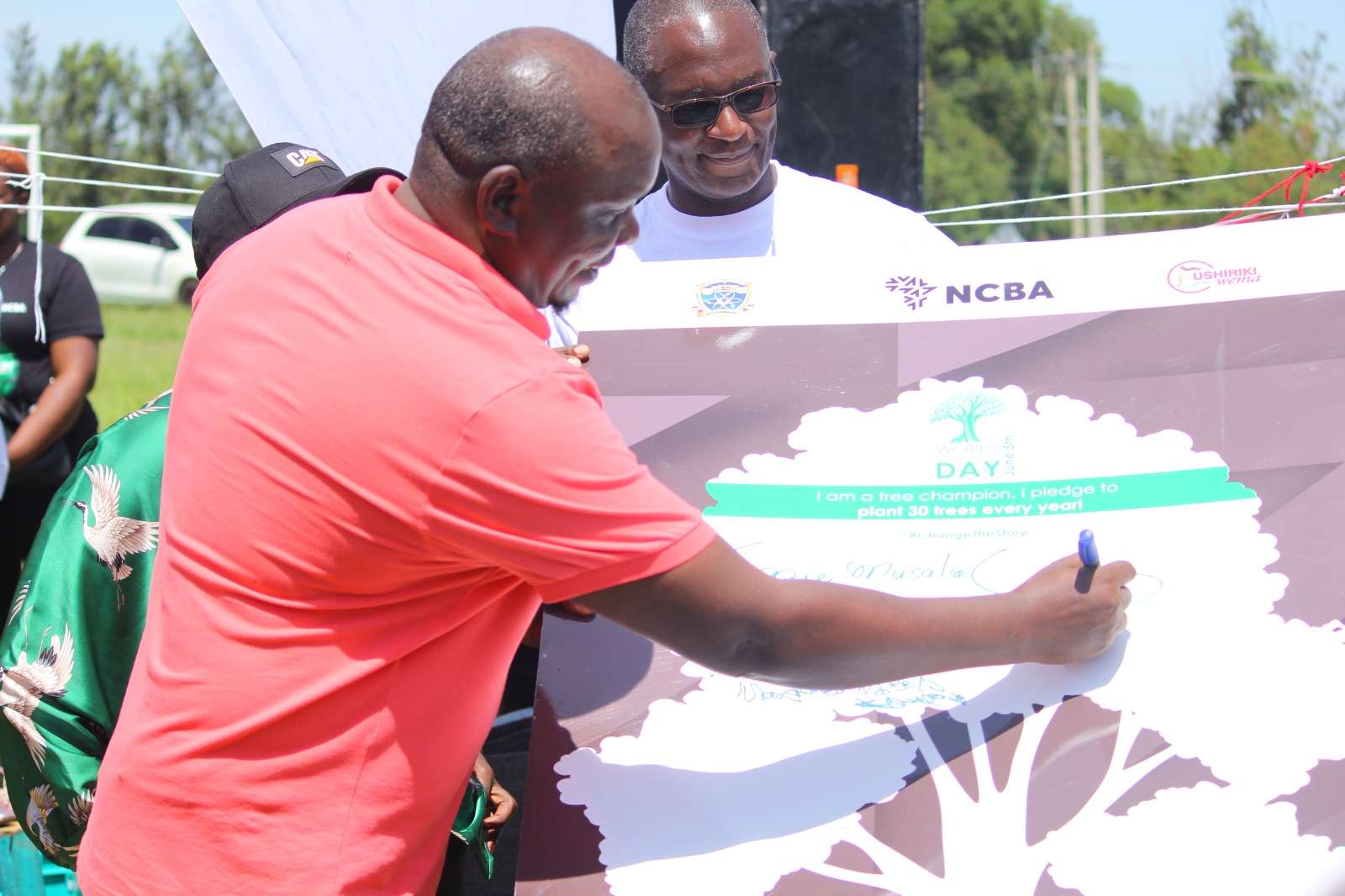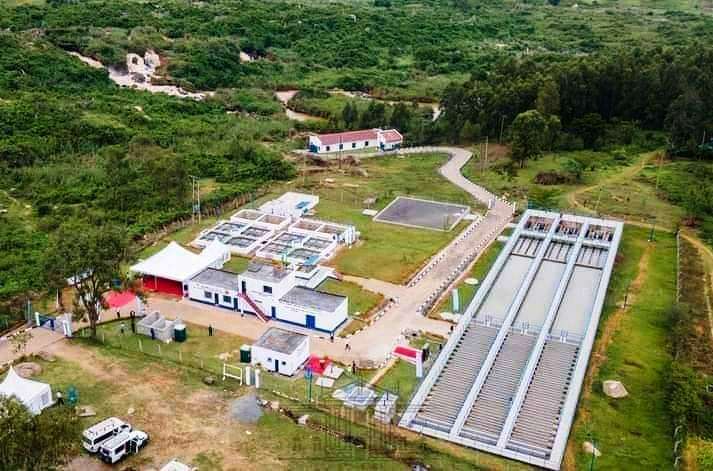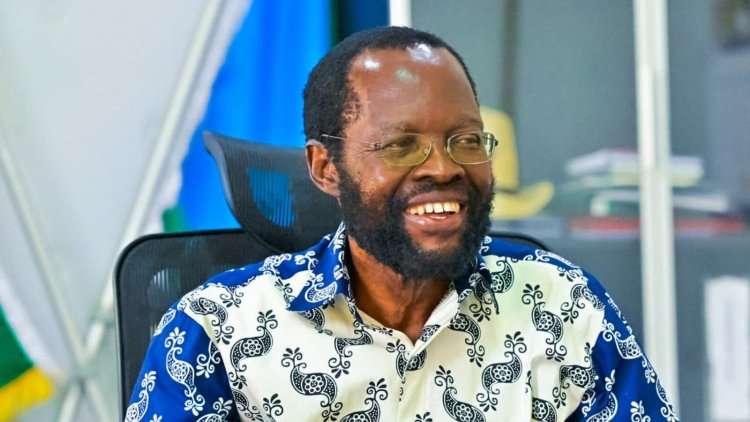By The Weekly Vision
Ahadi Kenya Trust CEO Dr Stanley Kamau has said that the recycling of plastics should be included in the new competency-based curriculum (CBC) as a topic and strategy to help fight plastic pollution in future. He was speaking at Kibabii University on Monday during the world environment day themed ‘Beating plastic pollution’, Mr Kamau urged the Ministry of Education to consider his proposal affirming that it will greatly help the country fight plastic pollution.
“If this topic will be included in the CBC syllabus, then it will help Kenya fight plastic pollution with a big percentage,” Kamau said. He argues that the public should also be sensitized to the effects of plastics on human health and the environment. Dr. Kamau in addition, called on Kenyans to be innovative and use old plastics to manufacture items that can go back to the economy. “We should be innovative and come up with the idea of making items from the plastics, I have seen people make chairs from plastics while others produce power from garbage, let us follow such steps and recycle plastics to make a free Kenya,” Kamau said.
The CEO states that his Ahadi Kenya Trust organization plays a major role in environmental conservation asking the public to keep tidy in their areas. “Let us plant trees to beautify and clean up the places we stay, let us adhere to President Ruto’s call of planting 15 billon trees,” he said. Bungoma governor Ken Lusaka said that we must safeguard the health of our planet at this critical time when the world is stepping up efforts towards combating climate change. Lusaka said that among the challenges that people face include climate change, deforestation, pollution and biodiversity loss.
“No matter how small our actions are, they can have a significant impact on the world and the communities we live in. Whether it’s how we consume products or how we use energy in our homes or work place, every decision we make impacts the environment,” Lusaka said. The governor said that human beings can contribute to the well-being of the earth by adopting sustainable practices and making environmentally conscious choices in their daily undertakings adding that making a difference is as simple as conserving water, reducing waste, recycling and using eco-friendly alternatives.
The county boss added that raising awareness and advocating for change is also crucial. “Conversations about environmental issues should be encouraged, as well as education and support for sustainability initiatives. Our actions can inspire others to take action, creating a ripple effect of positive change,” he said. Lusaka said that World Environment Day is a reminder that people’s actions on plastic pollution matter. The steps the governments and businesses are taking to tackle plastic pollution are the consequence of this action. “It is time to accelerate this action and transition to a circular economy. It is time to beat plastic pollution,” Lusaka said.
Lusaka noted that as we think globally, the responsibility to help find solutions to the environmental challenges facing our people lies squarely on our shoulders and therefore we must act locally. Lusaka says that with this year’s world environmental day theme, the County Government of Bungoma acknowledges the danger caused by the irresponsible use of plastic in the environment noting that it takes over 200 years in the environment for the plastic to decompose.
In Bungoma, Lusaka says that the biggest menace of plastics in the environment include the contaminated soils, clogging of the sewer lines and waterways, breeding grounds of mosquitoes during the rainy seasons, open burning hence air pollution, livestock ingestion of the same hence causing livestock diseases and death. With the above challenges, Lusaka reported that the Plastic carrier bag ban is 85% successful in Bungoma while the national average is about 95% which is commendable bearing in mind that Bungoma is a border County. “The 15% failure in Bungoma County is due to its proximity with the neighbouring country where the use of these bags is not outlawed,” he said, noting that the limited awareness of the same and negligence of the general public are contributing factors to this 15% too.
He said that the County Government is working closely with NEMA and Kenya Police to enforce the single-use plastic carry bags ban hence the positive results. The County Government of Bungoma has other well-established structures to manage and conserve the environment.
“My administration through the Department of Tourism, environment and climate change is and will forever remain committed to dealing with environmental matters across the County,” Lusaka said. To address the environmental issues, the governor said that his administration has formulated policies such as the climate change act and policy, Environmental and social safeguard policy, and Environmental policy solid waste management that are in draft forms.
Lusaka pointed out that he has also gazetted the County Environment Committee which brings together all environmental players in the County, noting that he has put in place climate change committees in all the 45 wards across the County. Dr David Abwoga, the Group Director of Finance of the National Commercial Bank of Africa (NCBA) said that the group joined other key players at Kibabii University in Bungoma County to plant trees as a strategy to attain the President’s call of planting 15 billion trees.
“Citizenship is a social license to operate and helps us get involved in the lives of our communities in order to ensure what matters to them is what matters to us and one of the key pillars in our citizenship agenda is environment and natural resources,” Abwoga said. He added, “In 2018 the country embarked on a journey to attain 10% forest cover and then we did set a target by 2022, at NCBA we joined hands with our theme to change the story and we have managed to plant 7,000,000 trees together with other stakeholders,” Abwoga called on Kenyans not only to plant trees but also to take care of the trees.
He noted that the home mark sustainability program ‘Change the story’ had established 1,000,000 indigenous seedlings nursery at Karura forest which has contributed to NCBA funding planting of over 300,000 trees across the country. He further said that their goal is to continue to support the government initiative and achieve the 30% forest cover. He called for partnerships and collaborations to help in the achievement of SDG’s.
“Let us all remember that a healthy forest and environment equals happy people and lets us all change the story,” Abwoga stated. George Wara, Bungoma County Forest conservator said that so far, Bungoma has planted over 1 million trees against a target of 2 million trees.
He said that the exercise is ongoing in the county noting on the environment day Bungoma planted 20,000 seedlings. Wara called on other environmental players to join forces and plant trees on over 4,000 acres of degraded land in the Mt Elgon ecosystem. “Our forces cannot rehabilitate the degraded ecosystem in Mt Elgon that is why I’m calling for your combined efforts,” Wara stated.




